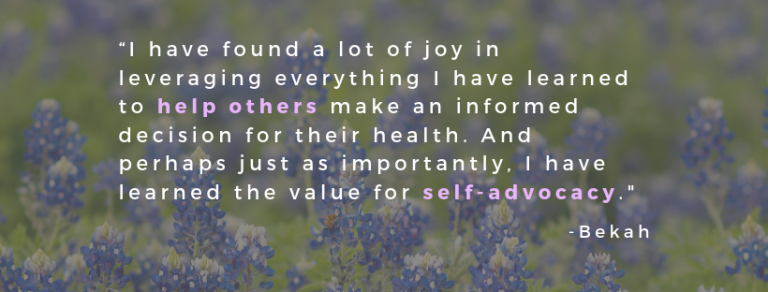Keratoconus Journey: Bekah

Road to Self-Advocacy
Bekah went to her local Department of Motor Vehicles (DMV) near Austin, Texas, to renew her expiring driver’s license, but she didn’t expect what would happen next. A 36-year-old mother of four, Bekah had never experienced any vision issues and initially believed the news that she had failed the vision portion of her driver’s license renewal exam to be a fluke from faulty equipment. Nonetheless, she made an appointment with her optometrist to see if there truly was an issue or if she could just return to the DMV to take the test again.
At her optometry appointment, Bekah faced more unexpected news when she was told she had a rare eye disease called keratoconus. The condition causes progressive warping of the cornea, and if left untreated, possible blindness. Unlike many who have to visit doctor after doctor to determine the root cause of their issue, Bekah was fortunate to be diagnosed on her first visit. Her optometrist assured her that she was not yet at risk of losing her vision and that he would be able to fit her for rigid gas permeable (RGP) contact lenses to help correct her vision. Bekah felt relieved and with the help of the contact lenses, she was once again able to pass the vision portion of the driver’s test and renew her license.
After a year of wearing the RGP lenses, she shared with her optometrist that she didn’t believe the lenses were helping her any longer. They decided glasses might be a better route but after a couple months of use, Bekah set them aside for the same reasons she had stopped wearing the lenses – they were not improving her vision.
Life Goes On
For the next few years, Bekah focused on her young family and job as a legal secretary. She placed her keratoconus on the back burner until one day when she found herself relying on a magnifying glass to read the small print of legal documents. At the time of Bekah’s diagnosis, treatment options for keratoconus were very limited and she didn’t know where to turn for help. She began to feel emotional remembering the fear of failing her driver’s test and not being able to drive. Bekah noticed that she would have to renew her license by 2020, a coincidence she found very ironic, and decided she had until then to do something about her condition.

The Path to Cross-Linking
Bekah learned everything she could about keratoconus, Intacs®, and cross-linking. She considered having Intacs surgery first, which is an implantable device that can help restore vision, but ultimately decided not to have the procedure performed.
Still determined, Bekah focused on finding a confident surgeon who was an expert in keratoconus and FDA approved cross-linking, a procedure that strengthens the collagen bonds in the eye that may halt keratoconus progression. Bekah researched and visited countless ophthalmologists all over her state of Texas before finally deciding on a doctor who was part of an ophthalmic group in Houston.
Bekah thought that finding a doctor she was comfortable with would be the hardest part of her journey. However, she quickly discovered that getting authorization by her insurance for FDA approved cross-linking was going to be another challenge prior to her surgery. The doctor’s office submitted a request for authorization to her insurance company, Humana.
After two months of waiting, the insurance company returned a denial and deemed the procedure to be “therapeutic and not medically necessary” and provided feedback that they’d only consider covering the procedure if it was considered medically necessary.
Bekah, who had been living with her declining vision for more than six years and understood the impact a lack of intervention would have, took it upon herself to prove to her insurance company the medical necessity of cross-linking in her situation. She returned to the optometrist who had originally diagnosed her and asked for medical records from all of her past visits. With this information, she filed an appeal with her insurance company.
Another two months passed, and finally, an authorization was returned from Humana approving the cross-linking procedure. However, it was unclear exactly how much of the procedure her insurance company would cover. Shortly after the approval, Bekah received the wonderful news that her cross-linking procedure would be fully reimbursed.
In July 2018, she underwent cross-linking on her left eye.

Getting Back on Track
Bekah was glad to get back to her normal routine following her procedure. Her recovery was slow but she shared her progress via vlogs on social media. Bekah also received magnifying readers to help treat a secondary vision issue that was occurring at the same time. Now, four months later, she is still adjusting to the changes in her vision and is combating some continued haziness.
Her right eye, which was also diagnosed with keratoconus, is being monitored by her doctors for any signs of progression.
One of her 17-year-old triplets has also begun to show early signs of keratoconus but has not been officially diagnosed. The family plans to continue follow up visits with corneal specialists to ensure she receives the best possible eye care.

Click here to read more KC Journeys.
The results described on this site are based on data collected regarding short- and intermediate-term efficacy of treatment. Individual results are not guaranteed and may vary.